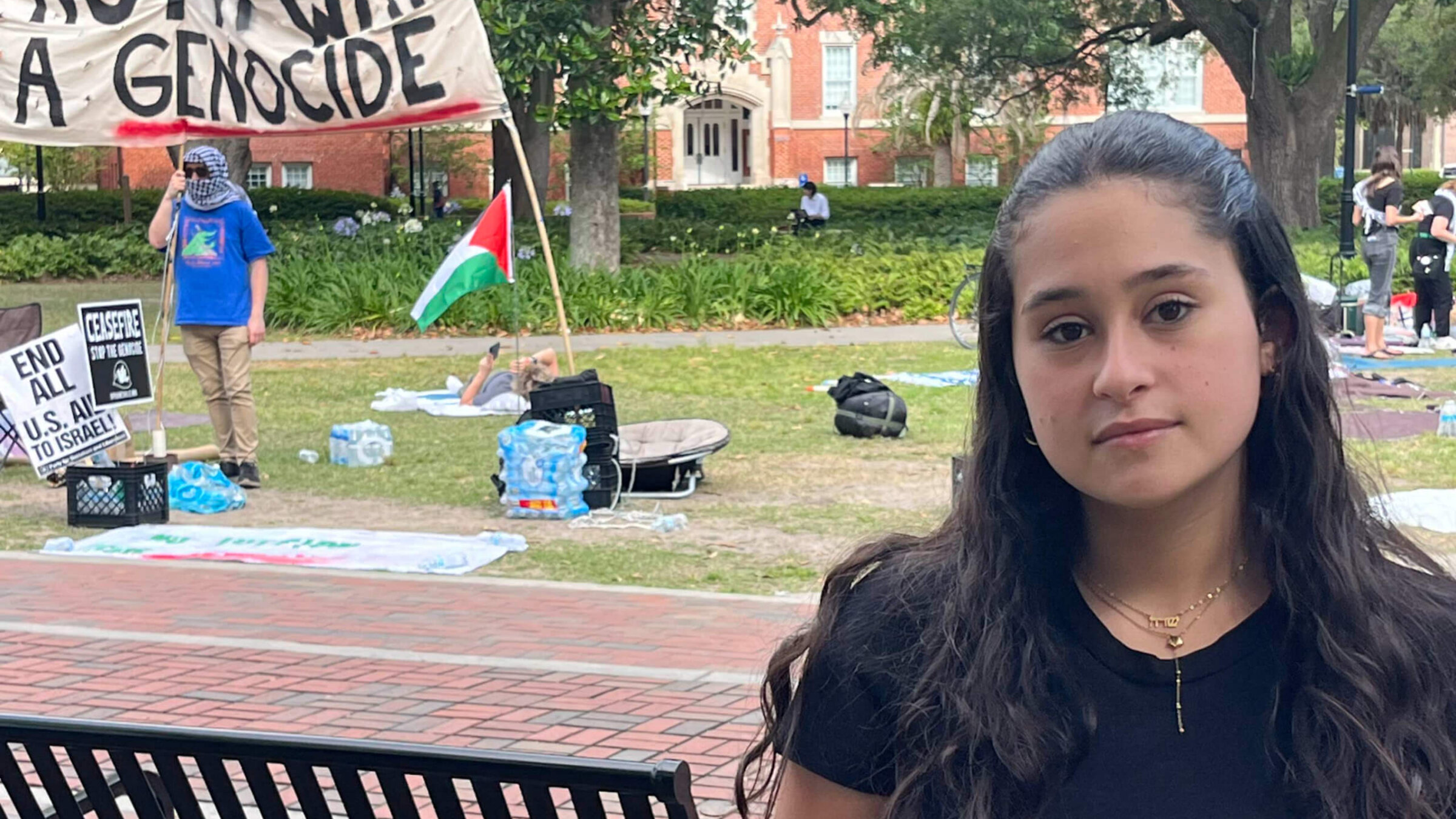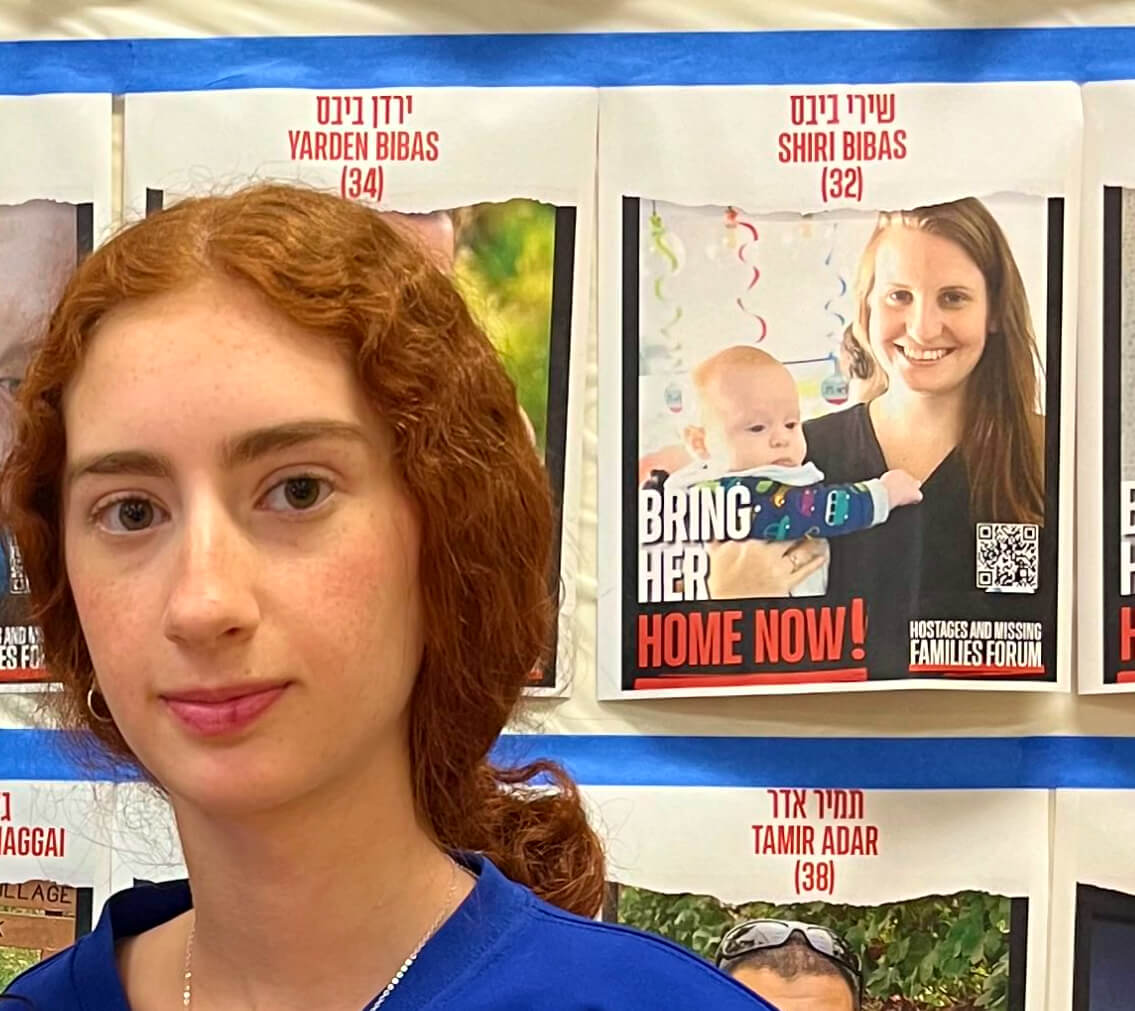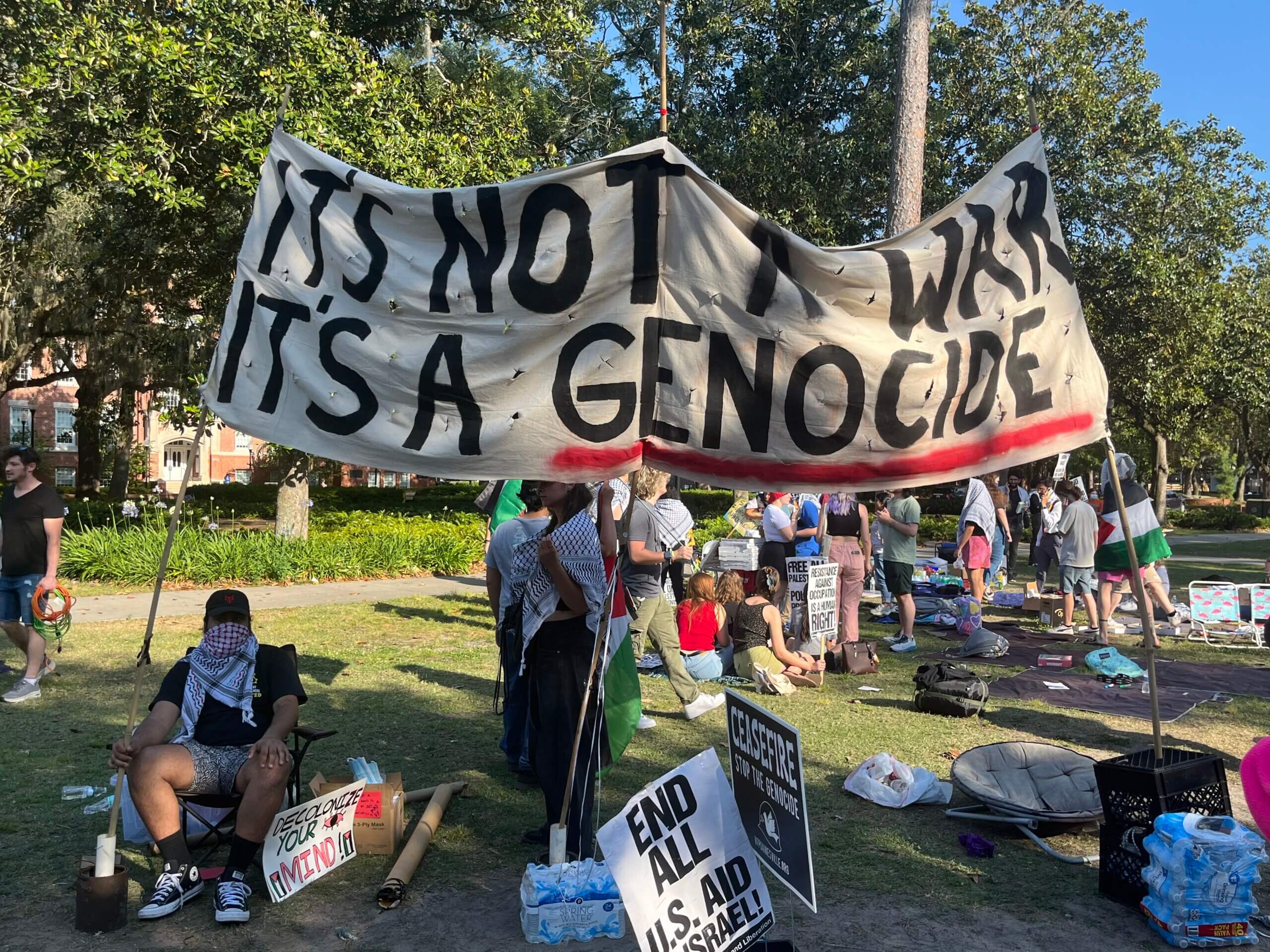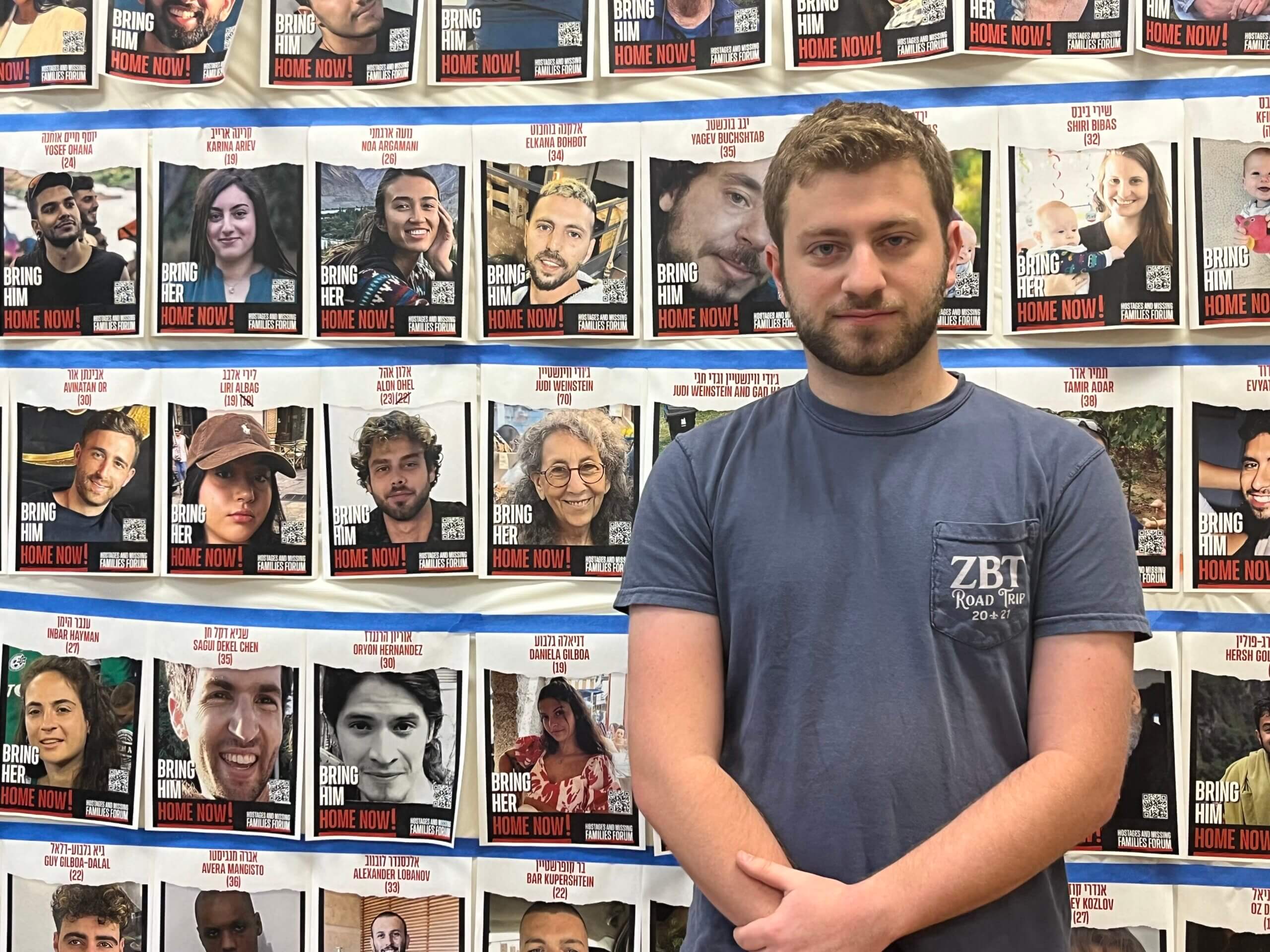The University of Florida calls itself a haven for Jews. For some students, it doesn’t always feel that way.
‘I didn’t really experience antisemitism until I got here,’ said one Jewish student

University of Florida student Sara Beer, the new president of the Jewish Student Union, near a pro-Palestinian protest on campus in April 2024. Photo by Ilene Prusher
GAINESVILLE, Fla. – As pro-Palestinian protests rocked elite campuses across the country this school year, Florida Gov. Ron DeSantis invited Jewish students with “a well-founded fear of antisemitic persecution” to seek refuge in his state’s public colleges. Ben Sasse, president of the University of Florida — which has more Jewish students than any public university in the nation — wrote an op-ed in The Wall Street Journal last week lambasting the way other schools had allowed “entitled activists” to take over their campuses. At UF, as the school is known, he promised that “the adults are still in charge.”
During a recent visit to campus, the flagship of the state university system, I asked almost a dozen Jewish students whether the school is the haven it claims to be.
“We’re aware that it’s not as bad here as it is elsewhere,” said Rhea Polkhovsky, a 19-year-old from the Philadelphia area, expressing the view of many.

It’s hard for Jewish students to feel isolated at UF. There are around 6,500 Jewish undergraduates here, Hillel estimates, making the school almost one-fifth Jewish. Graduate programs enroll another 2,900 Jewish students. The campus boasts vibrant outposts of Hillel and Chabad and four Jewish fraternities.
And while protests prompted Columbia University and the University of Southern California to cancel their main graduations, UF’s was held May 3 with little disruption. Unlike dozens of other schools, UF has had no “Gaza Solidarity Encampment,” though that’s not for lack of trying. After nine arrests in late April, pro-Palestinian students have returned daily to a small “Liberation Zone” where they continue to hold events, including a Nakba Week that started Monday. Earlier this year, DeSantis tried to ban chapters of Students for Justice in Palestine at Florida’s public universities.
But despite the crackdown on protests, and the official Florida welcome to Jewish students, many of them said they feel alienated on campus, and that it’s not the utopia Jewish students elsewhere may be seeking.
One freshman told me about an April protest on a lawn in the center of campus, in which she heard calls for the destruction of Israel, but also someone saying “kill all Jews.”
A group mounted a protest outside Hillel in February when it hosted a speaker who had survived the Nova Music Festival massacre.
Last semester, the Chabad House was vandalized, as was the banner of a fraternity that said “AEPi stands with Israel.”
“I didn’t really experience antisemitism until I got here,” said Gina Roginsky, an environmental science major from the New York area. Some of it came in the form of jokes she didn’t find funny. “Things like heiling Hitler.”
Though the Anti-Defamation League, assessing the climate for Jewish students in its campus report cards, gave UF a “B,” citing incidents before and after Oct. 7, students and faculty painted a complex picture of the university, one that seemed hard to sum up in a grade.
Fear, frustration — and hope
Protesters at UF and universities across the country are calling for divestment from Israel and an end to its military campaign in Gaza. But many Jewish students and faculty say the protesters’ demands too often morph into calls for Israel’s destruction and incidents of antisemitism.

Norman Goda, the Director of the Center for Jewish Studies at UF, said he saw a protest leader last month gesture towards a group of Jewish students watching from a nearby bench and say through a megaphone: “These people have no humanity.”
Goda, who studies and writes about genocide, also noted a banner on the campus lawn that reads: “It’s not a war, it’s a genocide.”
“Genocide,” he said, is a term that should be reserved for the deliberate destruction of a group, in whole or in part. “It’s upsetting because every Israeli kid and every Jewish kid on campus is an aider and abetter of genocide for them,” he said of the protesters.
For Jagger Leach, who has been president of the Jewish Student Union for the past year and serves as the head of ZBT, a Jewish fraternity, the most upsetting moment this semester came when protesters gathered outside Hillel when Jewish students came to hear from the Israeli survivor of the Nova Festival massacre.

“It was extremely heart-breaking and in a sense I felt kind of embarrassed,” Leach said. “Someone is coming all the way here and opening up about their traumatic experience, and this is what UF is offering them?”
Early last year, after rapper Kanye West, who now goes by Ye, went on public antisemitic tirades, chalked statements on campus walks declared: “Ye was right” and “Students for Ye.”
These and other incidents have prompted some Jewish students to tuck in or take off jewelry that identifies them as Jewish, and to contemplate removing mezuzahs from the doorposts of their dorms and off-campus apartments.
Maya Goldstein, the student who told me she heard “kill the Jews” at a recent protest, said that on the recommendation of friends, she changed her name on her Uber account to feel safer when calling for a ride, adding that many students with Jewish-sounding surnames have done the same.
I looked for Jewish students who had participated in the protests, but did not find them. Jewish Voice for Peace, which has been a leading organizer of pro-Palestinian campus protests across the nation, and was banned at Columbia and other schools, has a UF chapter, according to the national group’s website. But an inquiry to the listed email address was not immediately returned and a link to the chapter’s website did not work.
I did meet a non-student protester from JVP of Gainsville on campus. He objected to the idea that the protests were antisemitic.
“I think that’s garbage,” said Nico Segal-Wright. “No one is mentioning the demand to divest from weapons manufacturers. That is what the antisemitism charges cover up.”
Despite this year’s turmoil, many UF Jewish students said they found places on campus to gather strength. On Passover, more than 1,000 people attended a Seder hosted by Chabad.
And Leach noted Hillel’s “Spread Cream Cheese Not Hate” campaign, in which students got a free bagel and shmear when they signed a pledge to combat antisemitism and all forms of hate. This year 66 student organizations collected more than 5,500 pledges on a single January day — over twice as many groups and over 1,000 signatures more than last year.
“The number of signatures grew, but I think more importantly, the act of making that pledge changed,” said Rabbi Jonah Zinn, executive director of UF’s Hillel. “I think it meant more this year than it did a year ago.”
Sara Beer, Leach’s successor as president of the Jewish Student Union, said that concerns over antisemitism and anti-Zionism galvanized Jewish students to gather in Jewish spaces, and offered herself as an example.
“It caused me to go to Shabbat services a lot more,” she said.
A letter to the president
Goldstein, who grew up in Boca Raton and is majoring in English and psychology, had for months since Oct. 7 noticed pro-Palestinian protests at the edge of campus. In late April, as demonstrations at Columbia and across the country intensified, their UF counterparts moved to the heart of the university and attempted to set up an encampment.
That’s when Goldstein heard “kill the Jews” from one of the protesters, and said she went from feeling uncomfortable to feeling unsafe. She headed to her dorm room to write up what she witnessed and emailed it to Sasse.
“I understand the right to protest,” she wrote. But she also explained that she has family in Israel and is the granddaughter of a Holocaust survivors. To her ears, she continued, the protesters’ chant for Palestine to be free “‘from the river to the sea” sounds like “an antisemitic call to arms which seeks to deny Jewish people the right to self-determination.”
Goldstein said she is disappointed that Sasse has not replied to her letter. (University spokesperson Steve Orlando said it was received.) Still, she said she appreciates other ways in which Sasse has stood up for Jewish students — an approach that has been met with derision from students and faculty who accuse him of trampling on free expression
“You don’t get to take over the whole university,” Sasse said on CNN’s State of the Union last week, speaking of pro-Palestinian encampments on other campuses. “People don’t get to spit at cops. You don’t get to barricade yourselves in buildings. You don’t get to disrupt somebody else’s commencement.”
DeSantis recently reiterated his January offer to waive transfer requirements for Jewish students facing antisemitism where they are now enrolled. Orlando said several have decided to take the governor up on it.





















